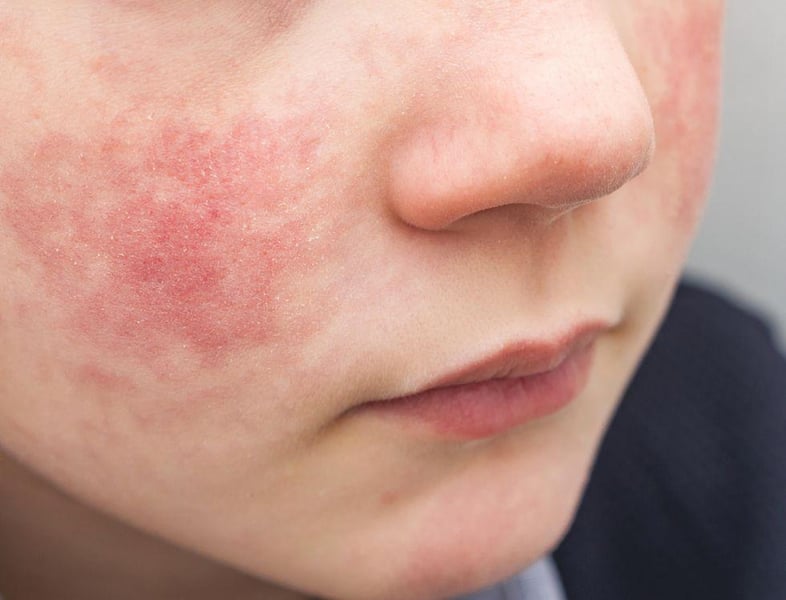Monday - Friday 9am to 6pm. Saturday 9am-2pm and Sunday 9am-1pm.
Prescriptions are available for in store pick up, curbside pick up and delivery.
Get Healthy!

- Posted September 8, 2021
Eczema Can Take Toll on Child's Mental Health
Eczema doesn't just irritate kids' skin. The often disfiguring condition may also be tied to depression, anxiety and sleep difficulties, new research warns.
A study of more than 11,000 British children and teens found that those with severe eczema were twice as likely to become clinically depressed as eczema-free kids.
"Eczema is an itchy red skin disease," said study author Dr. Katrina Abuabara, an associate professor of dermatology at the University of California, San Francisco.
But it's complex.
"The disease course and severity can be quite variable," explained Abuabara. "It often presents in early childhood, but can occur at any age. It tends to be episodic, flaring up, then remitting, but these cycles can be chronic over years.
"For many children, the disease seems to improve by their teen years, but we've found that some continue to have episodic disease into adulthood," she added.
Risk goes up among those with a family history of the disease or related conditions like asthma and allergies. And the condition "is quite common, affecting up to 20% of kids and 10% of adults," Abuabara noted.
Among the children she and her colleagues started tracking in 1991, the annual prevalence of eczema -- also known as atopic dermatitis -- ranged from 14% to 19% between the ages of 3 and 18.
Roughly 22% to 40% developed a moderate or severe form of the disease; the rest of the cases were mild.
In addition to being linked to a doubling of depression risk, severe eczema also doubled the risk for the kind of depressive and/or anxiety-linked behaviors that typically indicate underlying emotional and psychological difficulties. Severe cases also drove up the odds for sleep troubles.
The depressed children were more likely to be female, and from a higher social class, the authors found.
Mild and moderate eczema were not linked to a higher risk for childhood depression, the team stressed. But among children as young as 4, even less serious cases of eczema were associated with a 29% to 84% spike in the risk for internalizing behaviors.
That's concerning, Abuabara and her colleagues noted, because children who struggle with depression and/or brewing emotional turmoil may face a higher risk for depression, anxiety and poor overall health as adults.
"Many parents of children with eczema will tell you it can be a deceptively devastating disease," Abuabara said.
"Eczema has long been known to cause sleep disturbances which impact the whole family," she added, "and certainly can take a toll on emotional well-being. Increasingly, studies are revealing that some types of eczema are more than 'skin deep', and can impact overall health in a variety of ways."
In general, "skin disease is well known to affect patients' quality of life and cause depression," agreed Dr. Robert Kirsner, chairman of the department of dermatology and cutaneous surgery at the University of Miami Miller School of Medicine.
Children are often thought to be relatively resilient in that respect, said Kirsner, who was not part of the study team.
But "understandably, severe eczema, even in children, can cause depression and associated internalizing symptoms such as low self-esteem, fear and worrying," he said.
Of note is the finding that even "less severely affected patients apparently are emotionally affected by disease, and may internalize their feelings and manifest symptoms," Kirsner said.
This suggests "more aggressive, expert treatment for even mild eczema might improve the lives of children, and has potential for longer term mental health benefits," he added.
What can parents do?
Abuabara said they should strive to get the best care possible, not only for eczema itself but for the emotional hardship it may trigger.
"If you have a child with eczema that you're concerned about, it is important to talk to their doctor about optimizing their eczema treatment and to ask about behavioral screening and support through their clinic and/or school," Abuabara said.
The findings appear in the Sept. 1 online edition of JAMA Dermatology.
More information
There's more on eczema at the National Eczema Association.
SOURCES: Katrina Abuabara, MD, MSCE, associate professor, dermatology, University of California, San Francisco, and associate adjunct professor of epidemiology, University of California, Berkeley School of Public Health; Robert Kirsner, MD, PhD, chairman and professor, department of dermatology and cutaneous surgery, University of Miami Miller School of Medicine, and director, University of Miami Hospital and Clinics Wound Center; JAMA Dermatology, Sept. 1, 2021, online





